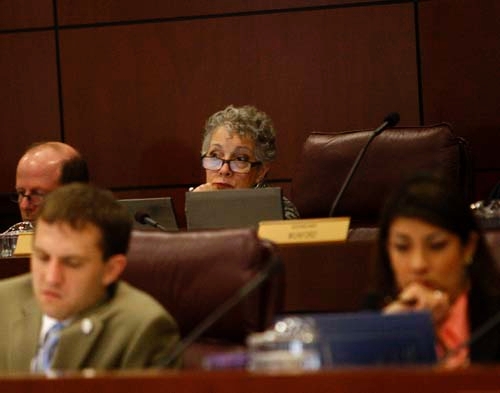Bill would limit value of mining tax breaks
CARSON CITY -- Mining companies in Nevada could lose tax deductions worth more than $2 billion under a bill making its way to the state Legislature.
Assemblywoman Peggy Pierce, D-Las Vegas, is poised to introduce a bill that would limit the value of tax deductions mining companies used to shave hundreds of millions of dollars from their latest tax bill.
Pierce wants to cap the value of legally deductible expenses at 40 percent of the total amount spent. "They would have to pay taxes on the other 60 percent," she said.
Although the amount mine operators pay in taxes fluctuates with mineral prices, if Pierce's proposal were to become law it could generate tens of millions of dollars in revenue at today's prices. That's money lawmakers could use to offset proposed cuts to education or social services.
"The 30-year experiment in radically small government in Nevada has run into the worst economy in 70 years, and we have a crisis," Pierce said.
Jim Wadhams, a mining industry lobbyist, said he was expecting the bill and is looking forward to a legislative hearing. He said it's an opportunity to explain to legislators the mining tax is a property tax and the deductions are part of assessing the value of mining land. That means the tax should reflect the expense of mining, processing and taking the materials to market.
"That is the issue that will come out of this, what is the fair market value of that dirt, not the mineral at the end of the process," Wadhams said.
Pierce's plan comes as the mining industry is under scrutiny by lawmakers from both parties.
On Monday, the state tax commission is scheduled to hold an emergency meeting to discuss whether mine operators' correctly paid taxes on proceeds from the last two years.
The meeting is the fallout from former taxation director Dino DiCianno telling a legislative committee that the state hasn't employed auditors with specialized training to evaluate mining taxes for at least two years.
That resulted in outcry from legislators, forced DiCianno to abruptly retire and prompted Gov. Brian Sandoval to call for the emergency meeting.
But neither supporters nor opponents of mining expect auditors to find evidence the industry underpaid.
What mining critics really want is what Pierce is recommending, a change in state laws that puts strict limits on mining companies' deductions.
"I don't think the audit is the problem, the problem is the deductions," said Jan Gilbert, a lobbyist for the Progressive Leadership Alliance of Nevada and longtime advocate of higher mining taxes.
For example, the industry reported about $5.8 billion in gross proceeds in 2009. After deductions the companies' net proceeds, the amount on which they pay taxes, was $1.8 billion. The amount of state taxes paid on the net was $47.8 million, plus another $46.4 million in county taxes.
In contrast, Strip casinos made about $5.8 billion in gross gambling revenue in 2010 and paid about $416 million in state taxes on the proceeds.
The disparity between mining and gaming, as well as the high value of deductions built into the net proceeds of minerals tax, has lawmakers questioning whether they should squeeze more from mine operators as a means to help balance a state general fund that's facing a 6.4 percent cut.
"Clearly it is not fair, I think that is the point," said Sen. Michael Roberson, R-Las Vegas.
Roberson, a conservative who is opposed to raising taxes, said new revenue from mining taxes should be offset by cutting the government service taxes Nevadans pay when they register their cars.
Gilbert and other liberals have said they don't think there would be a need to offset a mining tax increase with a decrease elsewhere, but would consider signing off on a tax swap if it accomplished their goal of forcing mining to carry a bigger share of the state's tax burden.
But a plan to increase mining taxes, even one with bipartisan support, faces difficult political and legal obstacles.
For starters, any tax increase would require two-thirds support from the Legislature. And it is unlikely proponents could muster such strong support without a signal from Sandoval that he would agree to sign it into law.
Sandoval, a Republican, was elected on a promise to oppose tax increases. Dale Erquiaga, his senior policy adviser, said the governor would veto deduction restrictions if they were motivated by a desire to raise state revenue, as opposed to merely correcting flaws in the statutes.
Also, the Nevada Mining Association could challenge a tax increase in court. Mining taxes are limited by the state constitution, statutes and regulations.
Contact reporter Benjamin Spillman at bspillman@reviewjournal.com or 702-477-3861.






















